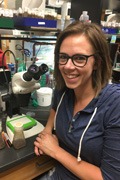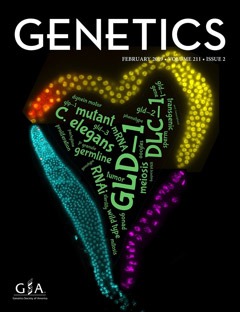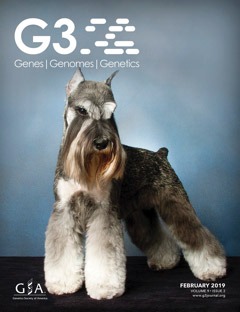Overview
GSA awards the Thomas Hunt Morgan Medal to individual GSA members for lifetime achievement in the field of genetics, recognizing the full body of work of exceptional geneticists. Recipients will have made substantial contributions to genetics throughout their careers and will have a strong history as a mentor to fellow geneticists.
GSA established the Medal in 1981 and named it in honor of Thomas Hunt Morgan (1866-1945). Morgan received the Nobel Prize in 1933 for his work with Drosophila and his “discoveries concerning the role played by the chromosome in heredity.” Morgan’s studies of the white mutation and discovery of sex-linked inheritance provided the first experimental evidence that chromosomes are the carriers of genetic information. Subsequent studies in his laboratory led to the discovery of recombination and the first genetic maps.
Nomination Process and Instructions
Full instructions on how to nominate for a GSA Award are available here.
Briefly, a nomination packet includes
- Nominee name and contact information
- Nominator name and contact information (if different from the nominee)
- Cover Letter (250 words or fewer)
- NIH-style biosketch (≤5 pages)
- Lived-experience statement (250 words or fewer)
- Selection questionnaire (see below)
- Demographic survey (optional)
Selection Questionnaire
- Describe five of the nominee’s most impactful research contributions to the field of genetics over the course of their entire scientific career. (100 words or fewer)
- Describe the nominee’s impact on the scientific community as a whole. This may include efforts to diversify the field and make it more inclusive. (100 words or fewer)
- Describe the nominee’s approach to and success with individual mentorship and training. (100 words or fewer)
- Describe the nominee’s scientific leadership accomplishments. (100 words or fewer)
Eligibility
To be considered for the Thomas Hunt Morgan Medal, the nominee must be an individual GSA member who has held an independent position for more than 15 years.
Important Dates
Nominations are due September 5, 2023.
Past Recipients
| 2023 | No award given |
| 2022 | Michael Lynch, Biodesign Center for Mechanisms of Evolution, Arizona State University |
| 2021 | Ruth Lehmann, Whitehead Institute and Massachusetts Institute of Technology |
| 2020 | Gerald Fink, Massachusetts Institute of Technology |
| David Botstein, Calico Life Sciences | |
| 2019 | Daniel Hartl, Harvard University |
| 2018 | Barbara Meyer, University of California, Berkeley |
| 2017 | Richard C. Lewontin, Harvard University |
| 2016 | Nancy Kleckner, Harvard University |
| 2015 | Brian Charlesworth, University of Edinburgh, UK |
| 2014 | Frederick M. Ausubel, Harvard Medical School and Massachusetts General Hospital |
| 2013 | Thomas Petes, Duke University |
| 2012 | Kathryn V. Anderson, Memorial Sloan-Kettering Cancer Center |
| 2011 | James E. Haber, Brandeis University |
| 2010 | Alexander Tzagoloff, Columbia University |
| 2009 | John Roth, University of California, Davis |
| 2008 | Michael Ashburner, Cambridge University, UK |
| 2007 | Oliver Smithies, University of North Carolina at Chapel Hill |
| 2006 | Masatoshi Nei, Penn State University |
| 2005 | Robert L. Metzenberg, University of California, Los Angeles |
| 2004 | Bruce N. Ames, University of California, Berkeley |
| 2003 | David S. Hogness, Stanford University School of Medicine |
| 2002 | Ira Herskowitz, University of California, San Francisco |
| 2001 | Yasuji Oshima, Kansai University, Osaka, Japan |
| 2000 | Evelyn M. Witkin, Rutgers University |
| 1999 | Salome Waelsch, Albert Einstein College of Medicine |
| 1998 | Norman H. Horowitz, California Institute of Technology |
| 1997 | Oliver E. Nelson, University of Wisconsin–Madison |
| 1996 | Franklin W. Stahl, University of Oregon |
| 1995 | Matthew Meselson, Harvard University |
| 1994 | David D. Perkins, Stanford University |
| 1993 | Ray D. Owen, California Institute of Technology |
| 1992 | Edward H. Coe, Jr., University of Missouri |
| 1991 | Armin Dale Kaiser, Stanford University |
| 1990 | Charles Yanofsky, Stanford University |
| 1989 | Dan L. Lindsley, University of California, San Diego |
| 1988 | Norman H. Giles, University of Georgia |
| 1987 | James F. Crow, University of Wisconsin–Madison |
| 1986 | Seymour Benzer, California Institute of Technology |
| 1985 | Herschel Roman, University of Washington |
| 1984 | George W. Beadle, University of Chicago |
| 1984 | R. Alexander Brink, University of Wisconsin–Madison |
| 1983 | Edward B. Lewis, California Institute of Technology |
| 1982 | Sewall Wright, University of Wisconsin–Madison |
| 1981 | Barbara McClintock, Cold Spring Harbor Laboratory |
| 1981 | Marcus M. Rhoades, Indiana University |



